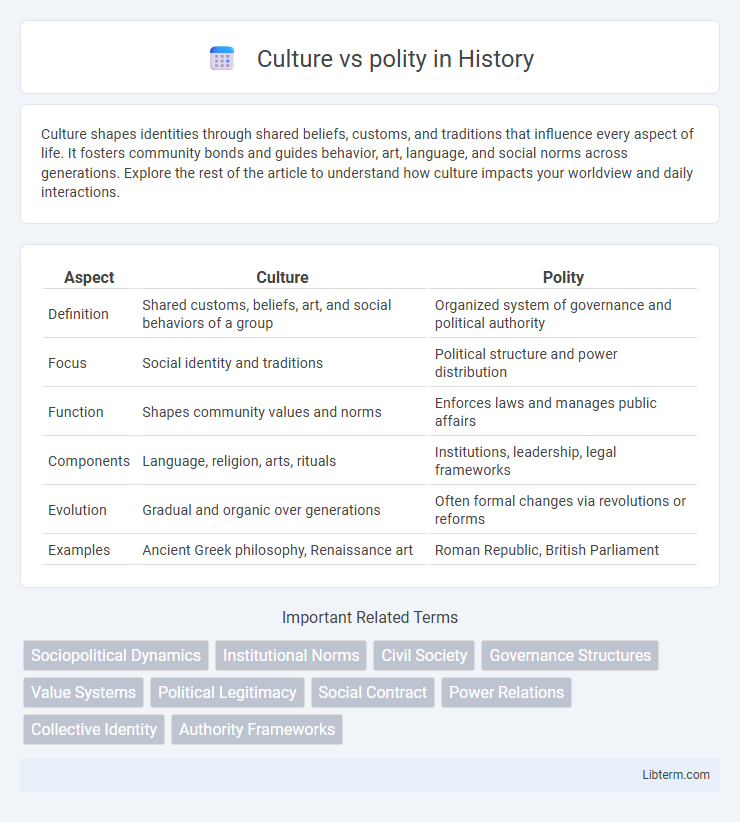Culture shapes identities through shared beliefs, customs, and traditions that influence every aspect of life. It fosters community bonds and guides behavior, art, language, and social norms across generations. Explore the rest of the article to understand how culture impacts your worldview and daily interactions.
Table of Comparison
| Aspect | Culture | Polity |
|---|---|---|
| Definition | Shared customs, beliefs, art, and social behaviors of a group | Organized system of governance and political authority |
| Focus | Social identity and traditions | Political structure and power distribution |
| Function | Shapes community values and norms | Enforces laws and manages public affairs |
| Components | Language, religion, arts, rituals | Institutions, leadership, legal frameworks |
| Evolution | Gradual and organic over generations | Often formal changes via revolutions or reforms |
| Examples | Ancient Greek philosophy, Renaissance art | Roman Republic, British Parliament |
Understanding Culture and Polity: Core Definitions
Culture encompasses the shared values, beliefs, customs, and practices that shape the identity of a community or society. Polity refers to the structured form of political organization and governance within a society, including institutions, laws, and processes that regulate power and decision-making. Understanding culture and polity involves analyzing how cultural norms influence political systems and how governance structures impact societal values.
Historical Evolution of Culture and Political Systems
The historical evolution of culture and political systems reveals interdependent developments shaping societies through time. Cultural norms, values, and practices influence the formation and transformation of political institutions, often reflecting power structures, social hierarchies, and governance models. Political systems evolve through revolutions, reforms, and colonization, with culture serving both as a foundation for legitimacy and a catalyst for political change.
The Interplay Between Cultural Norms and Governance
Cultural norms significantly shape governance structures by influencing laws, policy-making, and political behavior within societies. Governance systems reflect the underlying cultural values, traditions, and social practices, resulting in diverse political institutions and leadership styles globally. Understanding the dynamic interplay between culture and polity is crucial for effective public administration and fostering social cohesion in multicultural states.
How Culture Shapes Political Institutions
Culture profoundly influences political institutions by embedding core values, social norms, and collective identities that determine governance styles and policy priorities. Political systems often reflect cultural traits such as individualism, collectivism, or hierarchical respect, which shape legal frameworks, decision-making processes, and citizen participation. Understanding this interplay reveals why similar political structures function differently across societies, highlighting culture's role in institutional resilience and adaptation.
Influence of Political Structures on Cultural Identity
Political structures significantly shape cultural identity by determining the frameworks within which societal values, traditions, and norms evolve. Governance systems influence cultural expression through laws, educational policies, and public narratives that reinforce or suppress particular identities. Authoritarian regimes often impose homogenous cultural norms, while democratic institutions typically promote diverse cultural representation and pluralism.
Cross-Cultural Comparisons in Political Practices
Cross-cultural comparisons in political practices reveal significant variations in governance styles, citizen participation, and policy priorities across different societies. Societies with collectivist cultures tend to prioritize community-oriented policies and consensus-driven decision-making, whereas individualistic cultures emphasize personal freedoms and competitive political processes. Understanding these cultural dimensions offers critical insights into the effectiveness and legitimacy of political institutions worldwide.
Culture vs Polity: Points of Convergence and Divergence
Culture and polity converge in shaping societal norms and collective identity, influencing governance structures and policy-making processes. Divergence emerges as culture embodies shared beliefs, values, and practices, while polity represents formal political institutions and power dynamics. Understanding their interplay enhances the analysis of social cohesion and political stability in diverse societies.
Case Studies: Culture-Driven Political Change
Culture-driven political change manifests profoundly in case studies like the Indian independence movement, where cultural identity and nonviolent resistance strategies reshaped colonial power dynamics. The Arab Spring illustrates how shared cultural grievances and social media-fueled collective identity mobilized mass political upheaval across multiple states. In South Africa, the synthesis of cultural resilience and anti-apartheid activism culminated in the dismantling of institutionalized racial segregation and the establishment of a democratic polity.
Contemporary Debates: Globalization, Culture, and Polity
Contemporary debates surrounding culture and polity emphasize the complex interplay between globalization's homogenizing forces and the resilience of local cultural identities within political frameworks. Globalization accelerates cultural exchange, reshaping national policies and challenging traditional sovereignty, while cultural preservation efforts influence political discourse and policymaking at both domestic and international levels. The tension between cultural integration and political autonomy remains central to discussions on governance, identity politics, and global cooperation.
Future Directions: Bridging Cultural Traditions and Political Innovation
Future directions in bridging cultural traditions and political innovation emphasize integrating indigenous knowledge systems with contemporary governance models to enhance democratic participation and social cohesion. Leveraging digital platforms can facilitate inclusive dialogues that honor cultural diversity while promoting policy reforms aligned with global sustainability goals. Strengthening collaborations between cultural leaders and policymakers fosters adaptive governance, ensuring resilient and culturally sensitive political frameworks.
Culture Infographic

 libterm.com
libterm.com